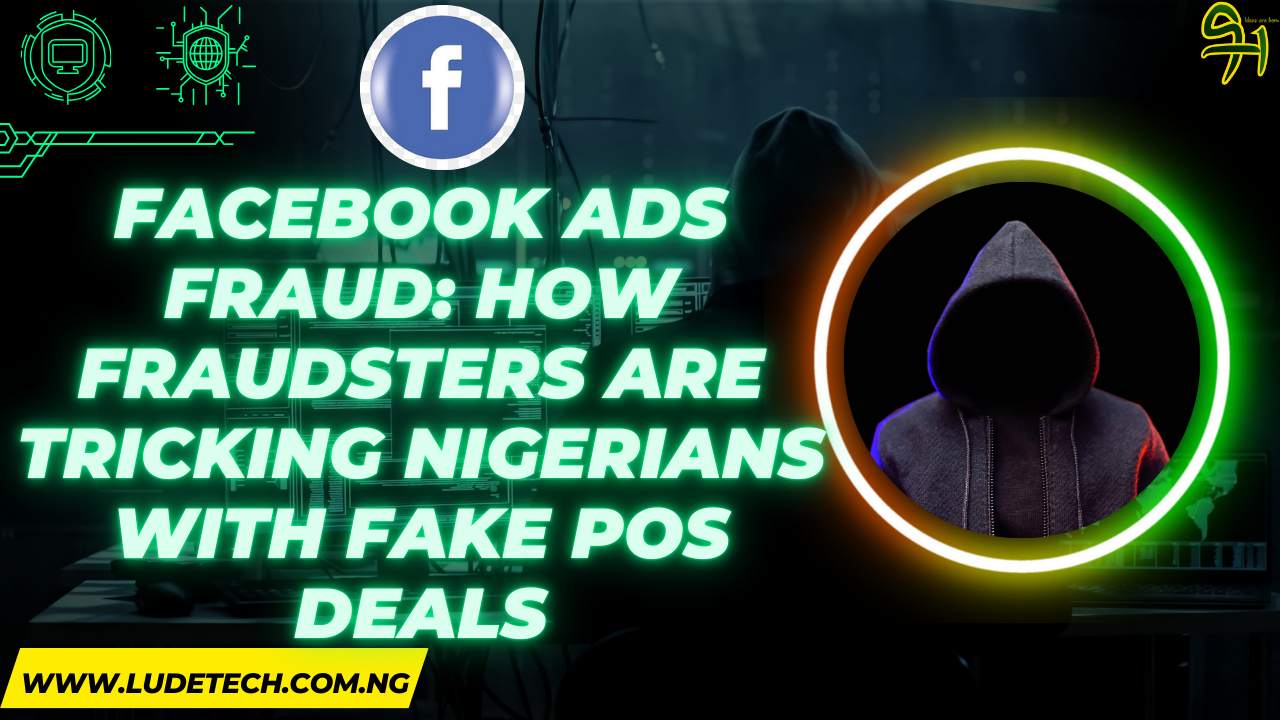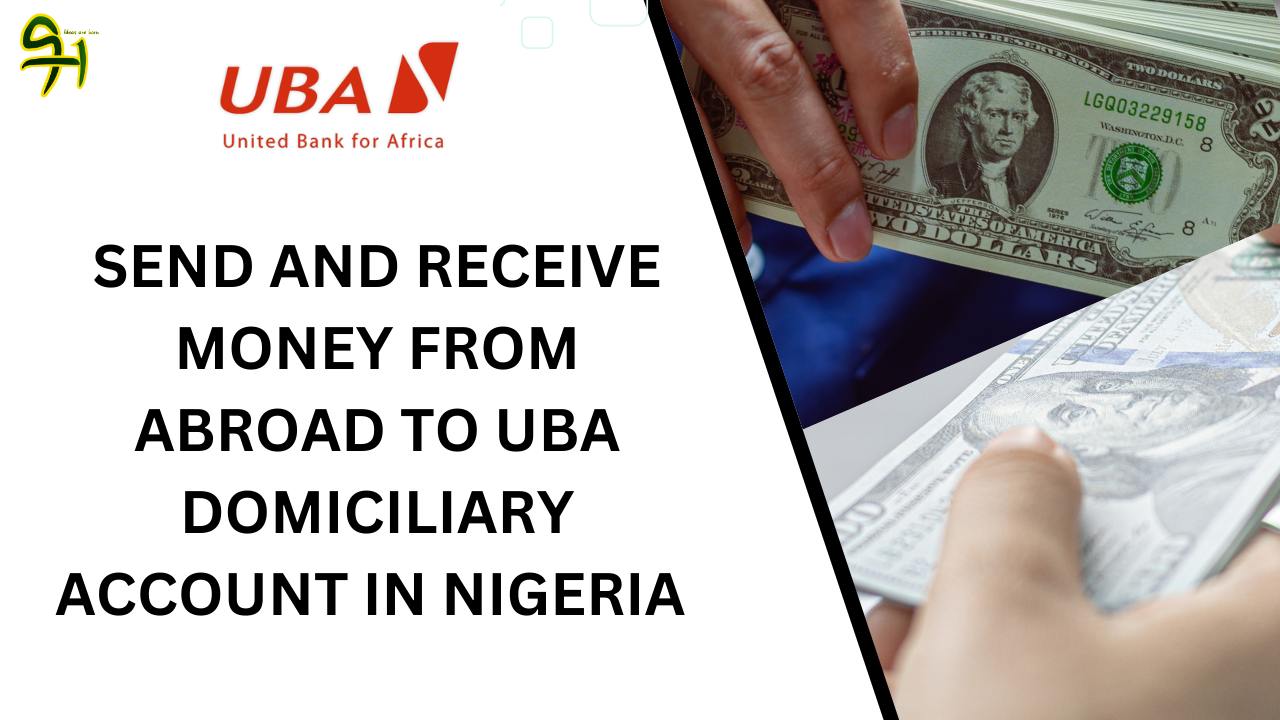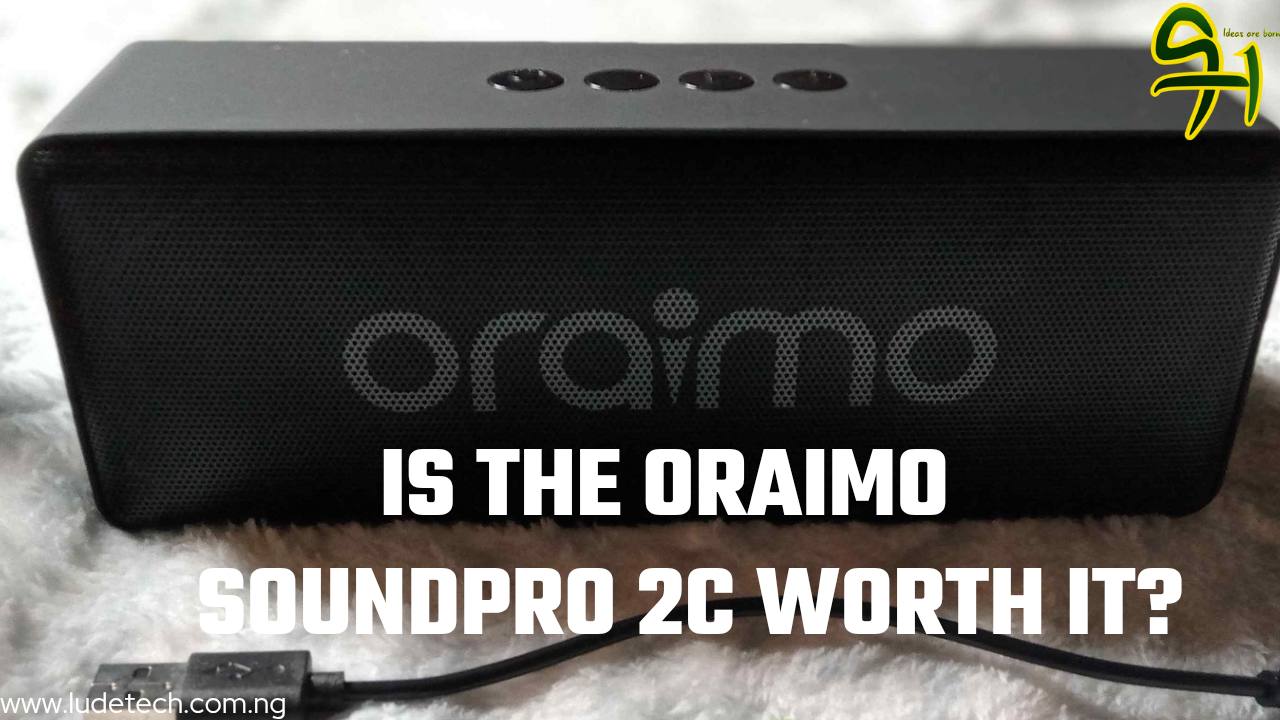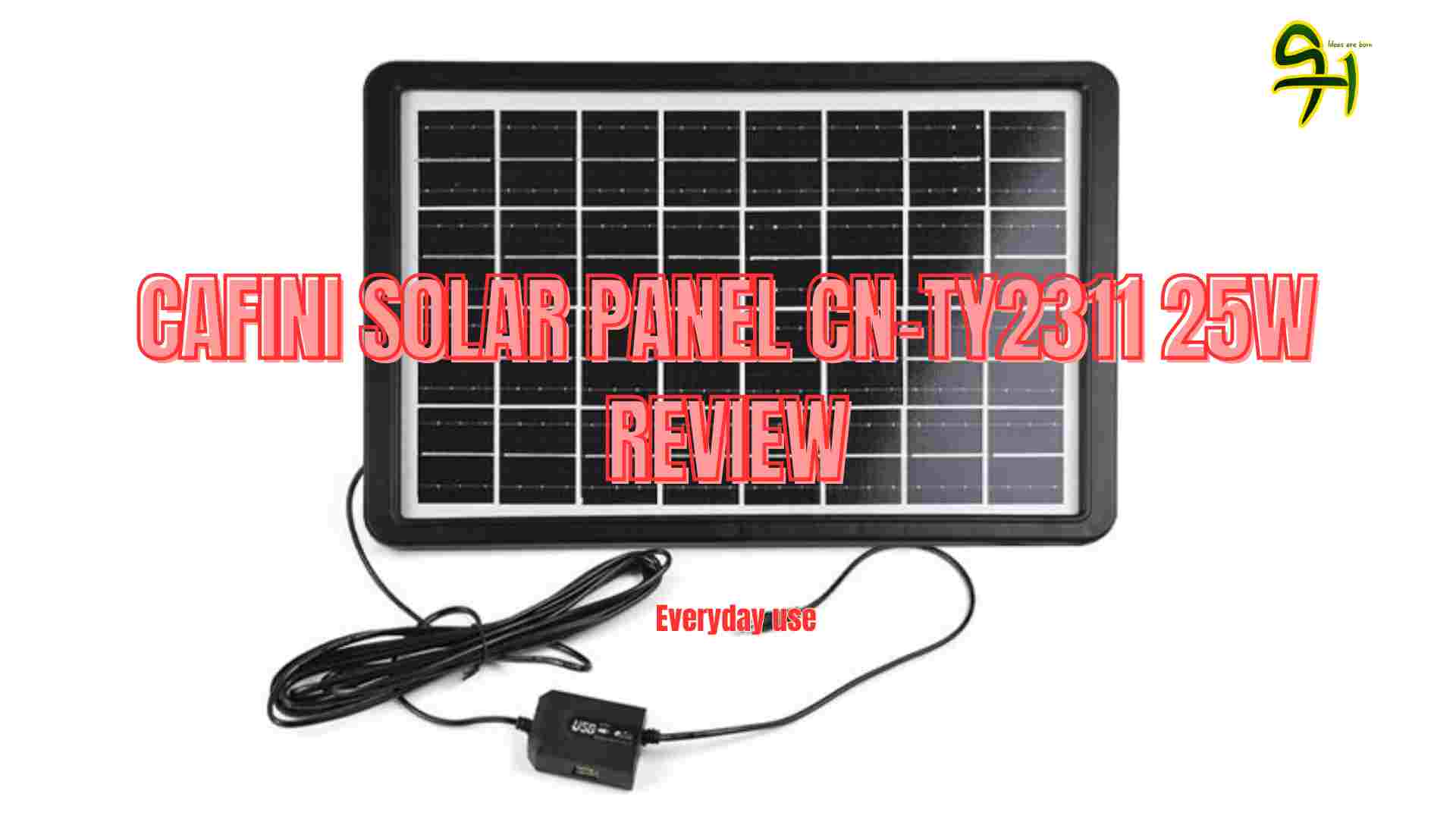Have you ever seen an ad for a cheap POS machine on Facebook? I did, and it cost me my hard-earned money. Facebook ad fraud has become rampant recently, and scammers are ready to pay to get you scammed. Social media platforms like Facebook, X, Telegram, and WhatsApp have become a marketplace for businesses and individuals looking to buy and sell products.
However, this convenience has a dark side, fraudsters are taking advantage of unsuspecting buyers with well-crafted scams. One such scheme affecting many Nigerians involves fake POS machine deals.
Many business owners and entrepreneurs rely on POS machines to process transactions smoothly. Scammers exploit this demand by creating fake ads, promising affordable and fast delivery of POS machines.
They disguise themselves as legitimate sellers or vendors, using convincing tactics such as professional-looking social media pages on Facebook and other social media, fake testimonials, and WhatsApp interactions to lure victims into making payments.
I recently fell victim to this scam and lost my money. What started as a simple online purchase quickly turned into a nightmare when the so-called seller couldn’t deliver the item after receiving payment.
In this post, I will share my experience, expose the tricks scammers use, and provide crucial tips to help you avoid falling into this same trap.
If you ever considered buying a POS machine or getting a device through Facebook ads or elsewhere, this article is a must-read. Scammers are getting smarter, but with the right knowledge, you can protect yourself and your business from fraud.
Table of Contents
How Facebook Ad Fraud Works
Scammers are everywhere around the globe not only in Nigeria, I have noticed that there are three steps scammers make use of.
Enticing potential customers through ad campaigns
This first step is where they create their ad campaign with great offers on Facebook and other social media. They will lie about the product, and write things that are somehow too good to be true. They can do this using captivating headings like ‘’promo’’, or other headings that attract potential buyers.
Gaining potential customer trust
The next thing they do is try to gain your trust. They sometimes share fake customer reviews on Facebook, WhatsApp, or other social media using fake chats, and they also try to convince you to get the fake product.
Obtaining mode
The last stage which I describe as the ‘’obtaining mode’’ is when they are at the stage of receiving the money from you and it is either after they collect the money from you they try to drag you to spend more or they block you from Facebook and other social media platforms.
My Experience: How I Got Scammed through Facebook Ad Fraud
It all started when my dad started up a small business in a remote area. I suggested he get a POS machine to support his business and also make it easier for customers to make payments. A friend of mine introduced me to MoniePoint, and after much consideration, I got a POS machine from a MoniePoint agent.
It was all good until we got a call from them telling us that we need to meet up to a certain amount of target. I was not aware of this because I did not take my time to research this properly. Since the business was in a remote area it was a bit difficult to meet up with the weekly target. I started searching for another POS machine that would be targetless.
I found an ad on Facebook
An ad with the title Opay Everywhere caught my attention because of its content, I couldn’t wait to get in touch with the agent.
Contacted the Agent
When I clicked on the ad on Facebook it redirected me to an Opay agent WhatsApp account. I chatted him up, and he told me they were on promo and I would get a chair, table, ATM card, banner, agent polo, and a free internet subscription.
It sounds too good in my ear and I was skeptical about this but still I wanted to give it a benefit of doubt. I made sure there was no target to be met. He also showed me some of the machines in their store.
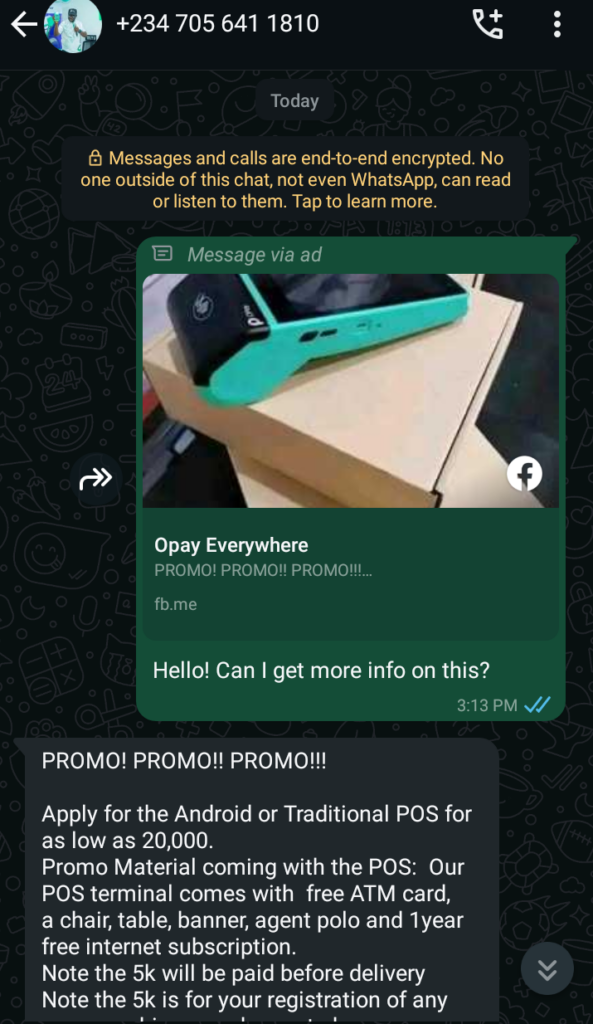
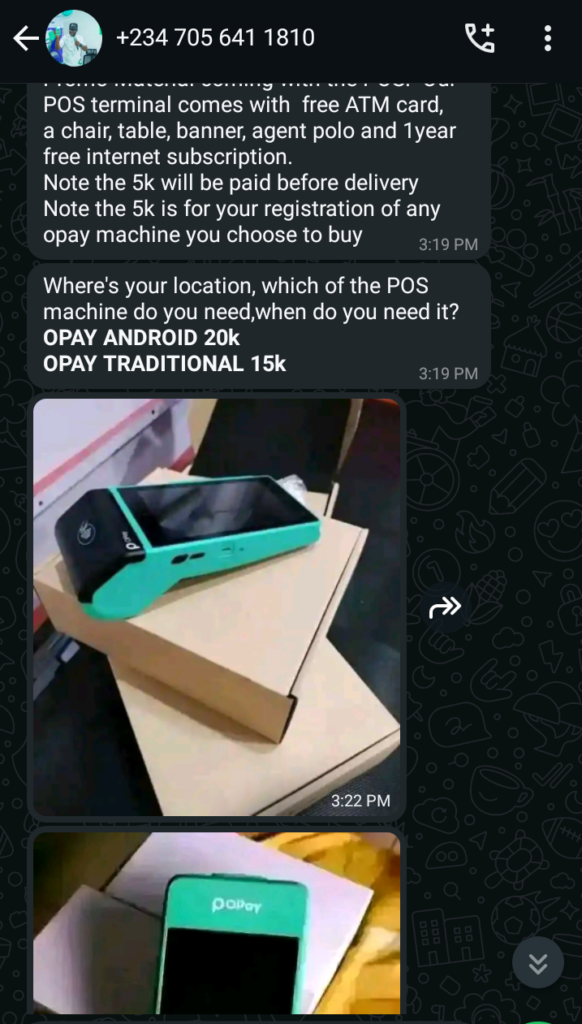
I made the payment
He asked me to make a down payment of 5,000 Naira before it would be delivered. This was fine because I also made a down payment of 24,000 Naira to the MoniePoint agent before getting the machine.
But what got me worried was that the money is to be paid for registration and not for the machine. Initially, when I got my first POS from MoniePoint I made a payment of 24,000 Naira directly to the POS machine, it was configured by their agent after getting my dad’s details. Also, the money was paid to my dad’s MoniePoint account, they created an account for him to make the payment.
After much thinking and convincing, I told him I would get back to him. He then called me through WhatsApp to explain and convince me more. Judging from his picture which is obviously fake I was expecting a kind of deep and mature voice but the reverse was the case.
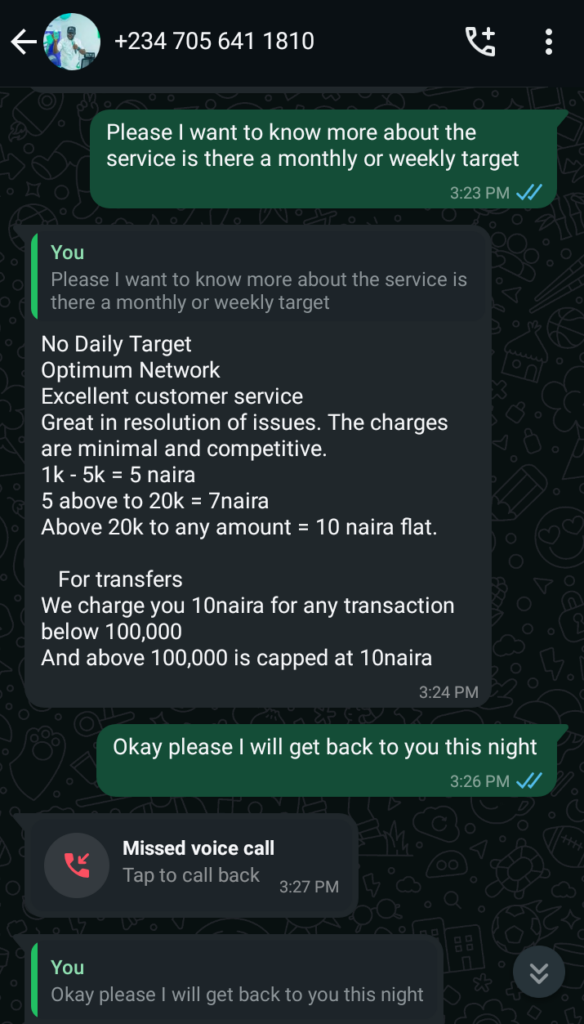
His voice sounds like someone who’s in his early 20 he talks fast, I find it hard to comprehend some things he said.
He later asked for my dad’s details (he was getting back on track because this was what I expected before sending any money), after collecting my dad’s details, he told me that my application was on pause because I had not made any payment for the registration. My Dad was almost on my neck, always asking me when the machine would arrive.
I told the agent to send me the account details to make the payment, but he sent a lady’s account details with the name ‘’Jennifer Dania’’ who looks like his girlfriend, but I waved that off and sent the 5,000 Naira.
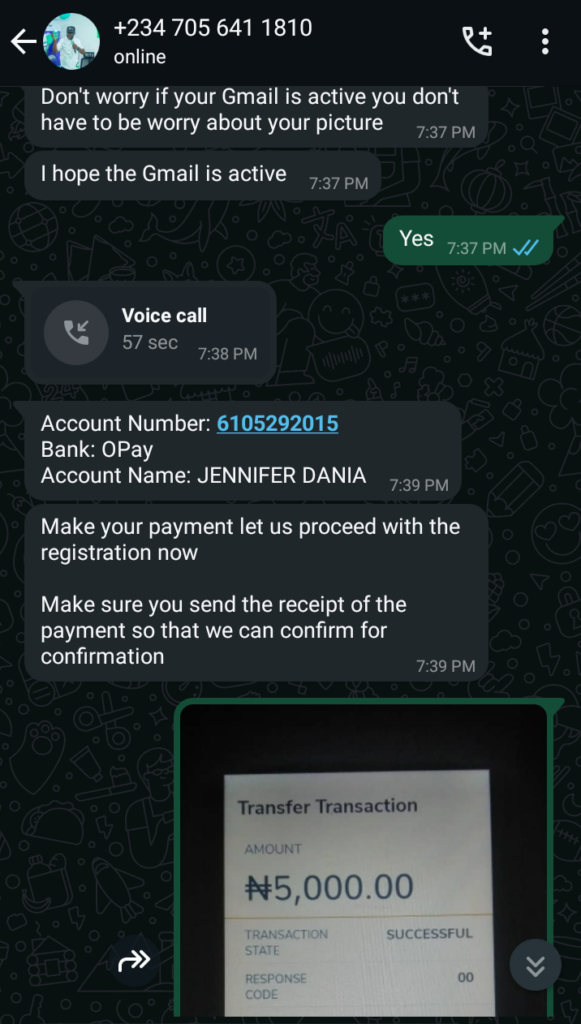
Realizing it was a scam
I got an email from a Gmail account with the name ‘’Opay Everywhere’’, with the message ‘’Congratulations sir your registration was submitted successfully and two good emojis, then proceed to activate your terminal’’. As soon as I read the email, I knew I had been scammed.
This was because the email did not look professional, it wasn’t close to what I was expecting, I mean almost everything about the email was wrong.

My observation
These were my observations.
- Unprofessional business email account.
- No subject.
- Mode of addressing (sir) instead of my dad’s name.
- The message lacks detailed information about the application.
Let me say this, if you are applying or purchasing an item from a registered company, they mostly make use of a professional business email account. A professional business email account is supposed to end with its domain name. For example info@ludetech.com.ng, support@ludetech.com.ng, or assist@ludetech.com.ng and so on, but it ended with ‘’@gmail.com’’.
You hardly see this from reputable companies. I know I did make use of ludetech@gmail.com on our Contact Us page, but that’s my email account we also have a business email account and I won’t mail you first with ludetech@gmail.com unless you do.
I wrote an article some time ago about how to know and create a professional business email account.
There’s also no subject on the email. Scammers are usually in a rush it takes carefulness to recognize this. The email sent to my dad doesn’t come with a subject. The subject is usually used as a heads-up of what the email is about. It’s like an email title. For example, if I want to resign from a company the subject could be ‘’resignation letter’’ or ‘’resignation email’’.
My dad was addressed as ‘Sir,’ which isn’t bad, but it would have been better if his name had been included. I’ve never applied for anything related to banking, and addressed that way.
Also, the email lacks what I call ‘’detailed information’’ no link, or subject, just scanty.I complained about this, but he messed up the more. The image below was sent to me by the agent for the sum of 28,000 Naira for what I don’t seem to understand. The image quality and editing were so poor that a blind man could see.

The last stroke that broke the camel’s back was the wrong spelling of my dad’s name. I bounced back at him showing him all his mistakes. But he said he can use it that way, but i am very sure he can’t because of Bank Verification Number (BVN) and the rest it would likely lead to a data conflict.
He started bombarding me with calls trying to talk me into sending the 28,000 Naira, but I insisted that he make a refund which he bluntly refused saying it is against the company policies.
How I tried to recover my money
I Reported to WhatsApp
I made sure I filed a report about the scam through WhatsApp. According to the message I got from WhatsApp, they said they would take a look at our last three messages and they will take actions. After I reported to WhatsApp, I couldn’t send a message to the fraudster nor could he send it to me.
Why I reported to WhatsApp was because I wanted them to take his WhatsApp account down so that he wouldn’t get more people to scam through the Facebook ad linked to his WhatsApp account. Up till now, I am yet to get feedback from the WhatsApp team concerning this issue.
Finally, tried to find the ad on Facebook, but it was difficult to find.
I Reported to Opay
I also reported to Opay the bank account he used to carry out the act. But I didn’t get good feedback from them. I was referred to my bank to report the issue and also report back to them through their email which they refused to send to me.
Their support system is so bad that even their customers are complaining as I write. I would have gone further but it will cost me more than the money that was scammed.
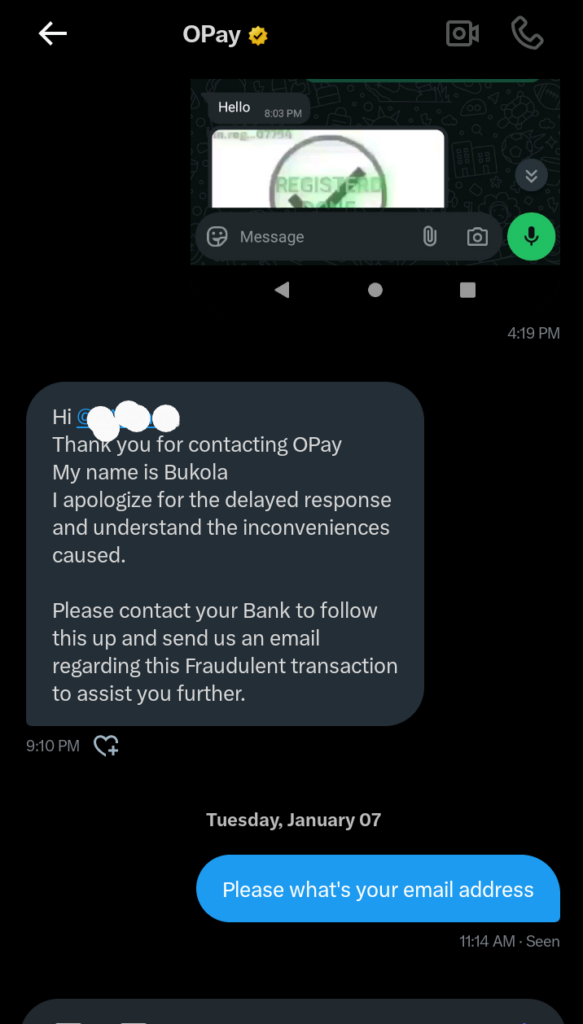
Common Tactics Scammers Used in Facebook Ads Fraud
Fake social media pages with stolen images.
Everything about a scammer is usually fake, they won’t give you real information they hide most if not all their identity. They usually create social accounts using someone’s pictures or post fake products the way this guy did. They usually take their time to brainstorm captivating headings message bodies and products.
The guy who scammed me made use of content that is too good to be true. He told me that they were on promo and that I would get a free umbrella, polo, chair, and a table if I got the product. The chair, umbrella, polo, and table will cost nothing less than a 100,000 Naira, for a product that is less than 30,000.
Fake testimonials
Scammers would do anything to gain your trust. They go as far as getting fake customers to review their product, and send you numerous messages from other clients with good reviews about their product. They even go as far as getting reviews from reputable websites.
I wrote an article about the Star-click shady ads business where users get to click on ads and get paid. But there’s a whole more to it and not just clicking on ads. They pay ad clickers money to make a good review on reputable sites like Trust Pilot. How did I get to know? I was asked by Star-Clicks to drop a good review on Trust Pilot to get paid some dollars.
Urgent/limited-time offers to pressure victims.
A good way to know a scammer is if you are being pressured a lot. I got tons of calls from this scammer, and even when I told him to give me some time that I would get back to him in the night he was still calling me on WhatsApp.
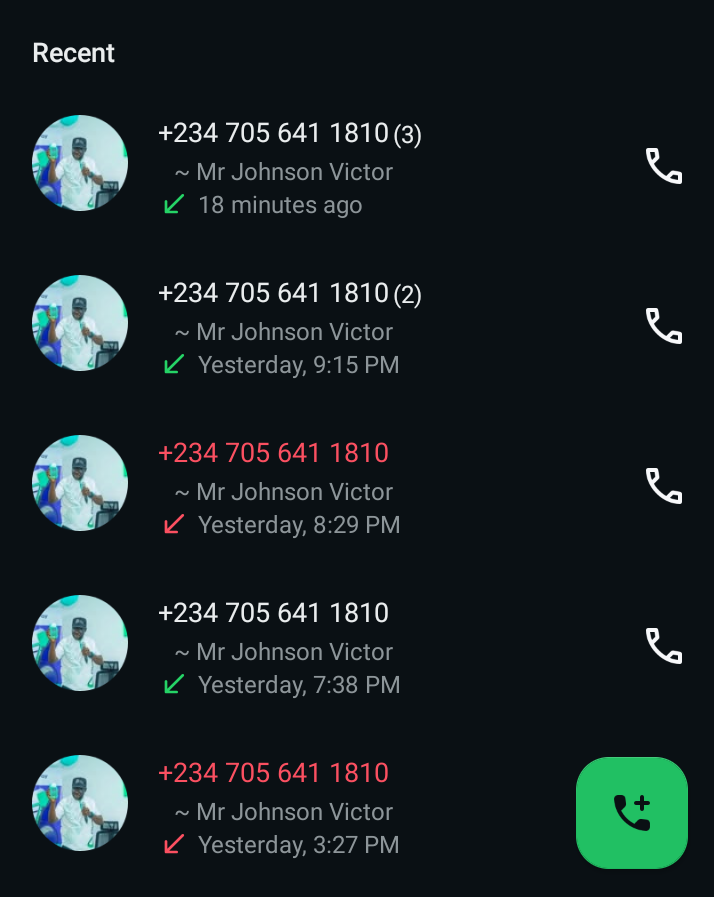
Asking for full payment before delivery.
If you intend to buy any product through Facebook ads or any other platform it is always good you make payment after delivery. Only make a card payment if you are redirected to the company’s website, and make sure it is authentic. Check the company’s URL, some scammers make use of fake URLs, what they do is clone the original website and register a domain that looks like the original website.
For example, the original website may be Amazon.com they will create something similar like ‘’Amazone.com’’.
Without carefully looking at it you might not notice the (E) on the fake domain, especially when you are using a smartphone the full URL might not be displayed at the top of the page compared to computers. Without carefully looking you might assume it’s the original website.
someone scammed me using this method on the Star-clicks, the fraudster sent me an email that looked exactly like Star-click, but a fake URL without the (–), before I could say ‘jack’’ my account was hacked and I lost all my money. I was also emailed again by the scammer to inform me that my account has been hacked an i should send them some dollars.
I wouldn’t blame myself that much but question Star-click about data breach. Because I have never shared any of my details online or offline, I never told anyone I was into the program, then how did a Pakistani fraudster know my email, and also sent me an email to hack my account?
How to Identify and Avoid Ad Scams
There are a few ways to avoid ads scams.
Verify sellers through official channels.
One of the easiest ways to verify if an ad is a scam is to verify from the seller’s official handle. I once stumbled on an ad by a well-known person on Telegram. I chatted with the scammer, I told him I needed the service, we talked about price and we agreed on a price. His Telegram page was so real you wouldn’t think he was a scammer.
The page on Telegram has more than 300k subscribers there’s no way you would even think about it not being original. The money for the service was huge in the sense that I would almost go broke after paying for it.
I have been seeing this same guy’s post on X, but I was not a follower then. I had to go to X and follow him up, and there I was able to get some information on his profile about people using his name for shady business on Telegram. Out of curiosity, I chatted him up on X, I sent some of the chats we had on telegram, but he didn’t reply. I guess his inbox was heavy and it would take some time to get to mine.
But he was still updating his posts on X. On the other hand, the scammer on Telegram was sending me messages, I told the scammer on Telegram to hold on and that I was still trying to raise some of the funds.
After a week I was still yet to get any message from the original guy on X, but he kept on updating his timeline. What I did next was to send all the screenshots on one of his recent posts and he denied being the one, I ended the deal on Telegram.
Check for verified business registration.
If you are planning to run a business in Nigeria you need to be registered, especially when you plan to run it for a long time.
I don’t know about other countries, but If you are in Nigeria you can check for the organization or business CAC number, with this number you can get a piece of good information about the business, the name, the registrar, the business location, and the phone numbers.
This information can be used in making inquiries about a product or service, it can also save you time and stress.
Avoid making payments before delivery
A lot of companies make use of pay before delivery, there’s always a discount on pay before delivery service because they get the money on time and pay for the product before shipping it to you.
One of the best advice I can give anyone looking for products or services online is to use the ”pay-on-delivery” service if you are not sure of the vendor or the seller.
Scammers do not want to hear the word ‘’pay-on-delivery’’ because it will make them come to your doorstep or provide a pick-up station where they will reveal their identity. So, they usually go for pay before delivery because they are likely not going to deliver anything to you.
Avoid sending money to Microfinance banks
A lot is going on now, many local scammers in Nigeria have moved from using well-known banks to microfinance banks. This is because they don’t need much to get an account, you can bypass some of the requirements set by the Central Bank of Nigeria (CBN).
Most of the microfinance banks are there for their gains and are not concerned about their customers. Some people in Nigeria are making use of them because of some reason. One of the reasons is low bank charges and illegal activities.
I know Bank Verification Numbers (BVN) in Nigeria are necessary for bank activities but some of these microfinance guys still operate, but limiting users to a certain amount of money they can deposit or withdraw.
I can still remember, some time ago I paid someone for a service on Facebook through First Bank Nigeria. He failed to deliver the service he also stopped replying to my messages on Facebook. I screenshot all the chats, printed them, snapped them, sent them to him, and promised him I would be visiting First Bank branch anytime soon.
He came back to life; messages started flying from left to right and he promised to deliver the service. It made me laugh so hard, i told him that he shouldn’t bother that I dont need the service anymore and he shouldn’t continue to scam people. I just wanted to prove to him that I can get him, if not make life miserable for him.
I was able to do this because it’s easier for me to go to the bank and lay a complain, and not text one Microfinance bank online to assist me for help just the way I did with O pay. Some of them don’t have any branch around the country they only operate mostly online.

From the picture above you could see that Bukola from Opay took a lot of time to respond and was not able to do anything after sending her all the evidence. I mean she couldn’t even send me their Email address for futher assistant she read and chose not to reply to my message anymore on X.
Research the seller by checking online reviews
This is important, if it’s your first time buying a product or service online I would advise you to go online and check out some reviews about the seller and the product. I once saw an ad on Facebook, I can’t recall, but I love the product. I went online to search for the product reviews and saw that it was not worth it, it saved me time and money.
Some sellers do go the extra mile to pay some reputable review blogs and websites for good reviews, but the truth is that not everyone is interested in their money and it won’t be easy to pay everyone for fake reviews.
Before I do any review here, I make sure I get the product and I make sure I use it and also study the product carefully, if it is not good then it’s not good, but if it is good then it is good.
Making research about the service or the product can save you time, and money and also reduce your chances of being scammed.
What to Do If You have Been Scammed
There are things you can do if you feel you’ve been scammed.
Report to Facebook or the social media platform to take down the scam page.
Before making a purchase, make sure you get a picture of the heading or the body of the ad if you are not sure of the seller. You can take screenshots, if you are using Facebook you will need to do this before clicking on the ad because you might find it difficult to get the ad back.
There are tons of ads displayed daily on Facebook so it will be difficult to find them back if anything goes wrong. Before reporting any ads, you will need evidence, this is what they will use to help you get back your money. The information provided will also be used to trace and track the ads.
As I told you guys, I wasn’t able to report on Facebook, but I was able to report on WhatsApp I also sent WhatsApp evidence of our last three messages. Although I am yet to get feedback from them, I believe if three or four people could lay a similar complaint the account will be banned.
Notify the bank
Another good thing to do is to notify the bank the seller used in receiving the money. You will need to go to the bank with evidence. They will make hard copies of this and push it to the appropriate security agencies.
I have seen scammers being arrested in the bank, but due to the high rise of POS operators, it has reduced. Sometimes the scammers are lured by the bank operatives to come to the bank where security agencies are already waiting to apprehend them.
Report to the Nigerian Police, EFCC or security agencies
If you got scammed and you are in Nigeria and it does not involve a huge sum of money, I wouldn’t recommend the Nigerian police or the Economic and Financial Crimes Commission (EFCC). This is because you are likely to spend more than you got scammed. But if it is huge or has caused a lot of harm the EFFC will be a good one, scammers in Nigeria shiver on hearing the word ‘’EFCC’’.
Scamming people off their hard-earned money can cause a lot of harm to them and can also lead to death. There is news trending currently about a 24-year-old Nigerian who was recently extradited to the United States (US) with the help of the (EFCC) and other security agencies for a sextortion case that led to the death of a teenager in the US.
The internet is so poweful that you don’t need a gun of physical combat to kill someone. Some people can’t stand scamming especially when the scammer has something valuable to milk them dry.
If a scammer gets hold of things like, your nudes and you are asked to pay some money for it not to be published online you should ignore and block the person, some of them are empty threats, most times they won’t send out your nudes even if they do in a couple of month or weeks everyone would move on after seeing it.
Never you take your life because of it, a good example is Egungun of Lagos. Someone got hold of his nudes and requested some money which he ignored they published the nudes, and we all saw it and laughed, but right now no one cares. If you continue sending money to fraudsters to cover up for your nude it will only make you broke because they will keep on using those nudes to get money from you.
Warn others by sharing your experience
Let others know about what is going on. You can’t be a hundred percent sure that other people won’t fall for any of these scams. As technology keeps evolving these guys try as hard as possible to move with it, they go the extra mile to learn new ways of scamming people.
Letting others know about their newfound trick could also help others avoid falling for the trap.
Conclusion
Facebook ad fraud and other social media scams are a growing menace, and scammers are becoming increasingly sophisticated in their tactics. By creating fake ads that appear genuine, they lure unsuspecting buyers with enticing offers and services including POS machines, only to disappear once payment is made.
To protect yourself from such scams, always verify sellers before making any purchase. Look for official websites, read reviews, and avoid deals that seem too good to be true. If possible, buy from trusted vendors with physical stores or authorized distributors. Additionally, reporting fraudulent ads to Facebook and other social media can help prevent others from falling victim.
As online scams continue to evolve, staying informed and cautious is the best defense. Always prioritize security over convenience, and remember: if an offer seems too good to be true, it probably is.
Have you been scammed through Facebook ad or other social media ad? I want to hear your side of the story; I will be in the comment section waiting.







